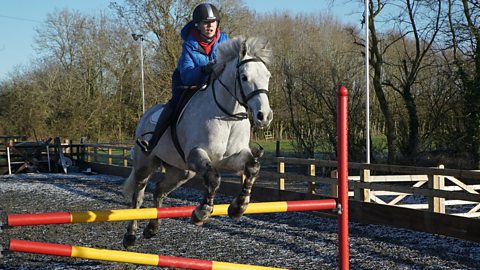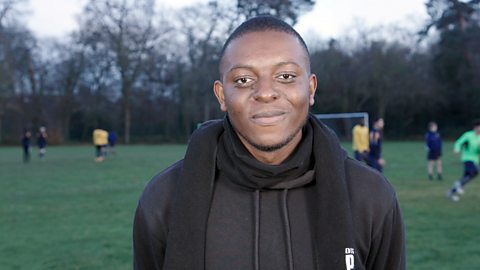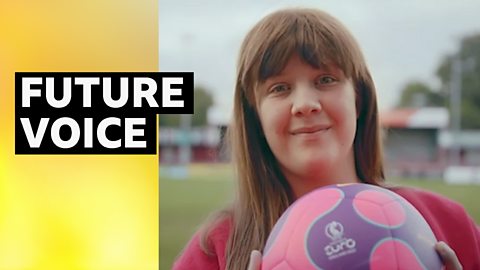Rachel Yankey on the people that supported her career
Former England and Arsenal footballer Rachel Yankey talks about the people, and the job roles, that supported her career as a footballer.
RACHEL: Hi. I'm Rachel Yankey and I am a former Arsenal and England footballer.
Obviously the manager and the coaches, who will give them information. Then you've got, like, physios, who obviously can help you if you've got sore muscles or you may have picked up an injury. The people that sort out the kit, the kit men and women. They can help you by making sure that you're wearing the right attire and your boots are the right fit.
One thing that I always remember from playing, after big games especially (was) the photographer. There was always one that would hand me a camera and allow me to take photos. So there's always an opportunity to be a photographer too.
People that helped me out, well, my first ever coach. Well, he wasn't a coach because he was a painter and decorator that set up a football team. But, he got me involved in women's football and the fact that they cared enough to do that was a real help to me.
Once obviously I'd made it into a professional team or an England team. People that can help with injuries, It was the medical staff that were always on hand. The strength and conditioning. Making sure that you're fit and strong enough to go out there to perform at your best. So, um, yeah, really rely on people. The backroom staff, they're probably the unsung heroes of a football team.
With any good team you need staff that are full of knowledge but also full of care and comfort and support to be able to help you on moments where maybe you're not mentally at your best and you need an arm round your shoulder and you need someone to listen to you. Or you need someone to actually really pump you up for the game and give you motivational talks and really get you hyped.
So, um, it's really good in a team that you've got different characters. Whether you're a laughy and jokey kind of person or you're very, you know, straight down the line. You'll still be needed within that team environment.
The unsung hero in most teams are usually the kit person or the medical team. They're the people that, you know, they see players when they're one-to-one or at their most vulnerable times. They're the people that the players really rely on to have those really sort of deep conversations, rather than going to a manager, who maybe picks the team, or a coach that has an influence in that way.
Most of us we want to play and we want to be a striker and have the glory and play professionally. But I think look at the other options of other jobs that you can be: medical, photography, whether it's journalism, you're writing about the sport. There's so many different things that you can do that obviously can still take your passion to another level.
Rachel Yankey is a former professional footballer, spending the majority of her career with Arsenal.
Rachel earned 129 international caps for England, making her the most capped England international player ever. She also played for Great Britain at the London 2012 Olympics.
As a child, Rachel used to play as the only girl on a boys football team, before later joining girls teams. She began her senior playing career aged 16.
There are lots of people in roles behind the scenes including physios, kit staff and photographers. The medical staff were always on hand to help with injuries. These backroom staff are definitely the unsung heroes.
Jermaine Jenas on the people that supported his career in football
Former England, Newcastle and Spurs player Jermaine Jenas talks about the people, and the job roles, that supported his career in football.
JERMAINE: Hi, all. I'm Jermaine Jenas, ex-professional footballer, now work in the media. 'Match of the Day' and 'The One Show' is where you'll probably catch me most.
That end product that you see on the pitch is a culmination of physios and doctors. Sports psychologists would be involved in that as well. Because going into this tournament (the players are) going be a bit unsure. They're going to be nervous. They might have a little kind of injury worry but they're pushing through it because they're desperate to play in a major tournament.
It's the whole team coming together to make sure that they go onto that football pitch at a hundred percent and ready to perform for their country. Because once they cross that line there is no hiding place and they need to be as prepared as possible. So you need everybody else in the backroom to make sure you're in that perfect spot.
This guy, his name was Keith. And Keith was doing these like visualisation techniques with me. Naturally you're kind of going, "What is this?" Like, I'm 15, 16. I just wanna go and play football. It massively changed my outlook on sport, life in general, on how powerful your mind actually is and what can be achieved with it. He was one of the biggest influences I had at that particular time. You know, a sports psychologist that didn't even talk to me about football or sport, it was more to do with my life. And, yeah, that was a big, big step for me.
There's a guy called a player liaison. If you think about it, we have a lot of foreign players coming into the country now to play in the Premier League. Your first port of call is gonna be like "Well, I don't know… I need to get a place to stay. Who do I pay my gas bill, my electric bill?". Most football clubs have a couple of these people at the club that make sure that the families are settled in, the players settled in. I always saw it as a massive job. I think it's one of the most important jobs as well, especially with the huge turnaround of players.
I was about 13, 14. Why I was thinking this far forward I don't know. But I knew I wanted to be a professional footballer. My mum was big into my education. So she was like, "Listen, let's do a deal. If the football dream doesn't work out what do you wanna do?" So we just drew up, like, a list of things that are in sport. Physio was the one that stuck out.
Physios live the moment with you. You know, whether those are happy moments. If I'd been with a physio for, I don't know, four or five weeks, in those horrible dark times where they're working on you and making sure that you're getting back fitter, and then you score that goal. They score that goal with you. You win something, they win it with you. When they're travelling and you're going through everything that this team is going through together. It's a fascinating job and one where they probably have a closer relationship to the players than a lot of managers.
You have to be really kind of humble when it comes to kind of wanting to achieve your dream sometimes. There are so many steps to get there. Like, people kinda look at me now, hosting 'The One Show', on 'Match of the Day', doing all these… They probably didn't see, you know, when I was doing a radio show that they probably don't listen to, or, you know, when I'm in the office with other pundits and I'm picking their brains, or presenters and I'm learning from them.
I just think being polite, being kind, being nice, ask the right questions and push yourselves. I'm still working hard, I'm still pushing, I'm still learning. You've gotta have that mentality in whatever it is that you wanna go and achieve, in any walk of life.
Jermaine Jenas is a former professional footballer, playing for Premier League teams including Newcastle United and Tottenham Hotspur.
Jermaine made his professional debut aged 17, with Nottingham Forest, and went on to earn 21 international caps for England.
When I was around 13, I sat down with my mum and came up with a back-up plan if I didn’t make it. Being a physio really stood out. I put 100 percent into my football, but also made sure I took the subjects I needed to pursue becoming a physio too.
Where next?
Job inspiration: Roles in sport. collectionJob inspiration: Roles in sport
Hear from young people doing a wide range of roles across the sports sector. Where could your sporting passion take you?

Bryan: football coach. videoBryan: football coach
Bryan is the head of a football academy.

The Women’s Football Fan of the Year with big hopes for a broadcasting future. videoThe Women’s Football Fan of the Year with big hopes for a broadcasting future
Erin Carroll is urging other young girls to get involved in the game at local level and help breed the next generation of female football influencers.
